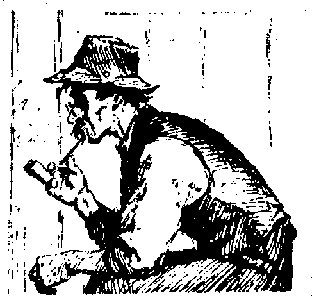
The weather of late had been rainy, windy, and generally unseasonable, especially for a touristy area like that which surrounded the The General Store.
Days remained hot and nights cooling down, so that on the higher mountains one began to see smoke from hidden chimneys. Mr. and Mrs. Storekeep had noticed a run on small packages of cocoa mix and special soaps usually employed in washing woolens.
It was a Monday morning, and after opening the store, Mr. Storekeep sorted the area newspapers for their eventual lineup on the counter space, where folks who were checking their mail and buying those papers usually lined up, almost as if in a cue at a bus-stop.
Suddenly the door flew open, allowing an especially watery amount of rain to enter from the great outdoors. The droplets, propelled by an unusually fraught wind, accompanied The Curmudgeon, his eyes slanted against the rain he was escaping from, his mouth with definite downturn at each lip-edge.
“I just don’t understand about greed,” he announced to nobody in particular, since the only folks in the store remained the Storekeeps, Mr. and Mrs.
“What is the problem?” they both asked in unison.
“You might remember my wife’s Uncle Federal—that’s right, that’s his name because his father was a postal employee and his mother worked for the local branch of a federal bank in Atlanta. They are here for a visit and brought along a pile of specialty magazines that they subscribe to. You know, those very slick magazines that are all pictures with soul-less captions, printed on thick glossy pages and dedicated to practically nothing.”
“Well, those pages might have been dedicated to nothing,” said Mrs. Storekeep, “but that nothing was enough to send you off on a stormy tangent.”
“There is,” Curmudgeon said, “a page of trendy items to purchase from trendy shops all found in trendy cities like London, Paris, or New York. And the items pictured just sent me off in a tizzy!”
“Name a few,” said Mr. Storekeep.
“Well,” he answered, “how about a straw hat that closely resembles those hats hanging over in the farmer end of the store, only here they’re called raffia hats and sell for $178 apiece. Or, a gold-plated warthog skull brought to you by one shop owned by Eduardo Garza —
He paused for emphasis and continued, “Or a ladies gladiator boot that is one of the ugliest things I have ever seen, without a price but simply a stated ‘price on request.’
“What really got me was a Paula Rubbenstein wool blanket priced for $2,000, not to mention a Berluti calfskin suitcase for a mere $8,650, or a pair of well-used Boj Décor German Navy binoculars for $400, or a Brunello Cucinelli leather shirt for ladies than comes in at $3,995.
“This is insane and especially bad because the Congress is trying to cut back on food-stamps for the American citizens who have had no luck in finding jobs!”
“I think,” said Mrs. Storekeep, “they are doing that because of so-called welfare cheats.”
“Seriously,” continued Curmudgeon, “I heard about the swinging surfer from California I saw on Fox News who was using stamps to buy lobsters or prawns or something like that for his table. But you and I both know that the number of such cheats are so far down in the minority, their numbers probably match the voters cheating at the polls who no need photo ID’s before using their constitutional right to vote.
“I am appalled that the free market place is a-foul with over-priced goods for sale to the great American public while millions cannot find enough to eat without food stamps.”
“Curmudgeon,” said Mrs. Storekeep, “speaking for both of us, I dare say we basically agree with you. But never forget this is the one country in the world that allows freedom of speech, and also never forget that while given to free-thinkers like you, it’s also given to ill-educated people, the likes of which now roam the malls and shop the stores for much of little worth.”
“You are right,” he answered, “and I’ll try to remember same in the future.”
The rain fell with more power and climate change continued to rear its ugly head.
Peter Loewer has written and illustrated more than twenty-five books on natural history over the past thirty years.









